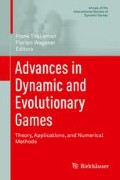Abstract
In this paper we formulate some easy looking but hard to solve problems from pursuit-evasion game theory. Then we focus on the main problem which, from our point of view, arises in dynamic cooperative games: this is the time-inconsistency of optimal solutions. We propose a system of payments, which we call imputation distribution procedure, that can keep the solution time-consistent when the game develops along the cooperative trajectory. It is shown that if payments are made according to an imputation distribution procedure, the cooperative solution can be achieved as a specially constructed Nash equilibrium in punishment strategies. This brings together noncooperative and cooperative approaches in modern game theory, as cooperation can be supported strategically.
Access this chapter
Tax calculation will be finalised at checkout
Purchases are for personal use only
References
Basar T, Olsder GJ (1982) Dynamic noncooperative game theory. Academic, London
Berkovitz LD (1964) A variational approach to differential games. In: Dresher M, Shapley LS, Tucker AW (eds) Advances in game theory. Annals of mathematics studies, vol 52. Princeton University Press, Princeton, pp 127–174
Dutkevich YG, Petrosyan LA (1972) Games with a “life-line”. The case of l-capture. SIAM J Control 10(1):40–47
Fleming WH (1961) The convergence problem for differential games. J Math Anal Appl 3:102–116
Haurie A (1976) A note on nonzero-sum differential games with bargaining solutions. J Optim Theory Appl 18:31–39
Isaacs R (1965) Differential games. Wiley, New York
Krasovskii NN (1963) On a problem of tracking. Prikl Mat i Mekh 27(2):244–254 (Russian)
Kuhn HW (1953) Extensive games and the problem of information. In: Kuhn HW, Tucker AW (eds) Contributions to the theory of games II. Annals of mathematics studies, vol 28. Princeton University Press, Princeton, pp 193–216
Petrosyan LA (1965) A family of differential survival games in the space R n. Dokl Akad Nauk SSSR 161(1):52–54 (Russian)
Petrosyan LA (1977) Stability of solutions of nonzero sum differential games with many participants. Vestn Leningr Univ 19:6–52 (Russian)
Petrosyan LA, Danilov, NN (1979) Stability of solutions in non-zero sum differential games with transferable payoffs. Vestn Leningr Univ 1:52–59 (Russian)
Petrosyan LA, Murzov NV (1967) Tag differential game with many participants. Vestn Leningr Univ 13:125–129 (Russian)
Petrosyan LA, Shiryaev VD (1978) Simple pursuit by one pursuer of two pursued. In: Some questions of differential and integral equations and their applications, vol 3. Yakutsk Gos Univ, Yakutsk, pp 103–108 (Russian)
Petrosyan LA, Zaccour G (2003) Time-consistent Shapley value allocations of pollution cost reduction. J Econ Dyn Control 27(3):381–398
Petrosyan LA, Zenkevich NA (2009) Principles of stable cooperation. Mat Teor Igr Prilozh 1(1):102–117 (Russian)
Pontryagin LS (1967) Linear differential games I. Dokl Akad Nauk SSSR 174(6):1278–1280 (Russian)
Shapley LS (1953) A value for n-person games. In: Kuhn HW, Tucker AW (eds) Contributions to the theory of games II. Annals of mathematics studies, vol 28. Princeton University Press, Princeton, pp 307–317
Steinhaus H (1925) Definitions of a theory of games and pursuit. Mysl Akademicka, 1(1). Reprinted in: Steinhaus H (1960) Naval Res Logist Quart 7:105–107
Yeung DWK, Petrosyan LA (2006) Cooperative stochastic differential games. Springer, New York
Acknowledgements
This work was supported by the St. Petersburg State University under research grant No. 9.38.245.2014. The author thanks Florian Wagener for many valuable comments.
Author information
Authors and Affiliations
Corresponding author
Editor information
Editors and Affiliations
Rights and permissions
Copyright information
© 2016 Springer International Publishing Switzerland
About this chapter
Cite this chapter
Petrosyan, L.A. (2016). Dynamic Games with Perfect Information. In: Thuijsman, F., Wagener, F. (eds) Advances in Dynamic and Evolutionary Games. Annals of the International Society of Dynamic Games, vol 14. Birkhäuser, Cham. https://doi.org/10.1007/978-3-319-28014-1_1
Download citation
DOI: https://doi.org/10.1007/978-3-319-28014-1_1
Published:
Publisher Name: Birkhäuser, Cham
Print ISBN: 978-3-319-28012-7
Online ISBN: 978-3-319-28014-1
eBook Packages: Mathematics and StatisticsMathematics and Statistics (R0)

